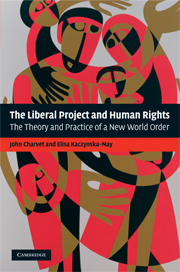Book contents
- Frontmatter
- Contents
- List of abbreviations
- Preface
- Introduction: what is liberalism?
- Part I Liberal beginnings
- 1 The contextual origin of liberal thought and practice
- 2 The Westphalian society of sovereign states
- 3 The growth of liberal universalism
- Part II The UN regime on human rights
- Part III Critique and defence of liberalism
- Notes
- Index
3 - The growth of liberal universalism
Published online by Cambridge University Press: 04 June 2010
- Frontmatter
- Contents
- List of abbreviations
- Preface
- Introduction: what is liberalism?
- Part I Liberal beginnings
- 1 The contextual origin of liberal thought and practice
- 2 The Westphalian society of sovereign states
- 3 The growth of liberal universalism
- Part II The UN regime on human rights
- Part III Critique and defence of liberalism
- Notes
- Index
Summary
Liberal pluralism and liberal universalism
Just as there is no inherent connection between the internal organization of the modern sovereign state and liberalism, so also is there no inherent connection between the external organization of the sovereign state in Westphalian society and liberalism in practice or theory. One might think that the affinities between liberalism and the modern state in its domestic form that we referred to in Chapter 1 will be even weaker at the international level. The sovereign state is a form that can be filled both in respect of its internal practices and its theoretical self-understandings in different ways. However, at the international level the Westphalian system, in its official ideology at least, is organized around the relations between states as independent and autonomous units: that is to say, in respect of their form as sovereign states and hence irrespective of their practical and theoretical substance. All such states have equal rights of self-government and so can decide for themselves how they will arrange their domestic affairs. Westphalian society, thus, seems committed to not having any connection with a particular conception of a just social and political order such as liberalism.
However, there is a sense in which Westphalian society does embody a liberal conception of international relations. Insofar as we conceive the society to be constituted by independent and autonomous entities that are individual states rather than individual human beings, then we can think of it as organized on the basis of a rights-based liberalism that applies directly to states and not to their subjects.
- Type
- Chapter
- Information
- The Liberal Project and Human RightsThe Theory and Practice of a New World Order, pp. 59 - 78Publisher: Cambridge University PressPrint publication year: 2008



